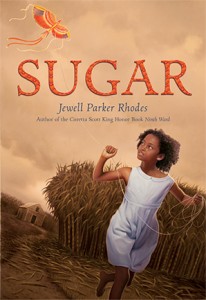A poet and author of fiction for adults, Jewell Parker Rhodes turned to writing for children with the highly acclaimed Ninth Ward, the story of an 11-year-old girl whose ailing grandmother—and her grandmother’s stories—help her to survive Hurricane Katrina in New Orleans and save the life of her friend and neighbor. She follows that more recent history with Sugar, a middle grade novel set in the more distant past, in Louisiana in the years following the Civil War.
 Sugar is a ten-year-old orphan who lives in her own shack and pays her own rent from her earnings, working in the sugar cane fields. She is named for the crop that has delighted people everywhere throughout history but that kills and maims those who cultivate it. Born under slavery, the child has never known freedom, for the plantation owners have already regained control over their land and instituted a sharecropping system that keeps the formerly enslaved workers miserable, uneducated, and in eternal debt. However, there is one difference—people can leave. And many do. One by one, Sugar’s friends and family depart for the North, leaving her under the supervision of the old people who refuse to leave. Her father has been missing since the war, and her mother died of overwork and sickness. Lacking enough workers, the plantation owner brings in Chinese laborers and tries to keep them and the black workers separate, but the adventurous Sugar finds a way to bring them together. The result, at first, is better working conditions, but the owner and overseer see the social order changing and make their own plans to destroy ties of friendship and support.
Sugar is a ten-year-old orphan who lives in her own shack and pays her own rent from her earnings, working in the sugar cane fields. She is named for the crop that has delighted people everywhere throughout history but that kills and maims those who cultivate it. Born under slavery, the child has never known freedom, for the plantation owners have already regained control over their land and instituted a sharecropping system that keeps the formerly enslaved workers miserable, uneducated, and in eternal debt. However, there is one difference—people can leave. And many do. One by one, Sugar’s friends and family depart for the North, leaving her under the supervision of the old people who refuse to leave. Her father has been missing since the war, and her mother died of overwork and sickness. Lacking enough workers, the plantation owner brings in Chinese laborers and tries to keep them and the black workers separate, but the adventurous Sugar finds a way to bring them together. The result, at first, is better working conditions, but the owner and overseer see the social order changing and make their own plans to destroy ties of friendship and support.
As in Ninth Ward, the author uses folktales as a guide for the characters and a parallel to the story events. Here, they include traditional African stories, as adapted by enslaved blacks, and those brought over from China by workers. Rhodes portrays an untold history in a way that immerses young readers in the story, as they follow Sugar’s attempts to bridge the chasms of race, class, and language. She is a remarkable character, and her courageous act at the end will stay with readers long after the cover is closed and the book returned to the shelf.
One of my favorite movies of the last five years is Beasts of the Southern Wild, the story of a six-year-old girl abandoned by her mother. Her father is teaching her to live on her own because he is dying, and she finds hope and strength in the diverse people and families of her coastal Louisiana community. Sugar made me think of this film, and while the film is for an older audience (who will appreciate the novel as well), excerpts from it, along with the novel, offer a vivid introduction to the rich heritages and cultures of southern Louisiana.
5 comments for “A Child on Her Own: Jewell Parker Rhodes’s Sugar”